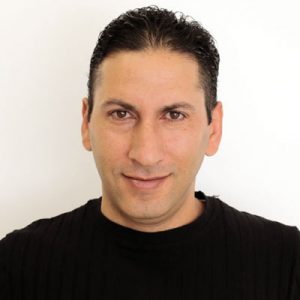Interview with Thaer by CBA ’23 and ZB ’23.
Thaer, a filmmaker, environmentalist, husband, father, and refugee, highlights his experiences throughout his childhood living in the Dheisheh refugee camp in Bethlehem. He describes his relations with his friends, family, and the Israeli soldiers who occupied the area. He begins with his family members, specifically his twin, with whom he has maintained a close relationship since his days living in Dheisheh Camp. He goes through his everyday life in the camp, including going to school with his friends. Additionally, his recollection of specific stories of his tumultuous interactions as a child with the soldiers in the camp sparked him to express his views on the 1948 conflict and the Zionist movement. He then passionately condemns the environmental degradation and destruction of Palestine by first world countries in Europe and the United States. He delves into his interest in filmmaking and the creation of his own film that provides social commentary on the Israeli occupation. Throughout the interviews, Thaer’s stories made it evident that he values family, honesty, friends, and community. The expression of these values in combination with his activism through his filmmaking provides a unique perspective on the dynamics of Palestine as well as his role in them.
Transcript:
I born in Dheisheh Camp in Bethlehem. There are three camps in Bethlehem. The biggest one is Dheisheh Camp. It’s about one kilometer. There is about sixteen thousand who live now in this camp. We are a big family. My father. My mother is passed away. She died. We are four brothers, three brothers and I and two sisters. We are family very close together. As a family it’s like fit sometime. I am a twin. My brother, his name Nad. Yes, I mean you feel safe and I think he feel safe because no one can touch you. I have another stories. We were playing marbles in the street and a group of Jewish soldiers, they take all this ball and they hit us. We was a group, maybe five or six children playing with this in the small street in camp. And they, they take it and they hit us. Their shoes and everything. They thought that some young people they use it to hit the soldier. Ok, this is not weapon. But it’s some kind of games. They take all the marbles. And my brother, a child also, and the soldier asks him, “Show me your hand.” My brother keep one hand closed behind his back and the other hand he show the soldiers. Then the soldier slap, slap him on his wrist. “Show me your other hand!” [laughs]
I think he’s maybe three years [old]. I swear I think he is maybe three years, and he slap him on his wrist. It’s ugly and stupid and criminal and…I’m not sure what, what we can do. Actually here in Palestine, we have many people. They make normalization with the Israeli Jewish. So sometimes I think maybe I can speak about this.
Each Jewish people have to [thank the] Palestinians because, before twenty years, the Palestinian accept the agreement peace. And the [Oslo] agreement peace the Palestinians take about twenty percent of all Palestine land. But they refuse this agreement – they throw away this chance. They want to take everything!
I am refugee, my house is stolen. Who is give you the right that you come live here and stole everything?
For me sometimes I look for honesty. Difficult, to be honest in any place. But this is I think a good thing. I try all the time to be honest. Sometimes I can’t be honest but I try to be all the time.
First world country, the United States. And first world Europe – they lie. All the time they lie lie lie. They remove all the nature because they destroy, destroy everything! They killed the Dead Sea, they destroyed the Dead Sea. They killed River Jordan. Before they come, there was a river. Now there is no river.
We want democracy, we want a green planet, we want beautiful life, and they destroy everything. And in the future, I think there is no place for us and for them. Because they are not from here.
But I’m planning to make a new film. I do some search, make film about environment. I like this art. Sometimes I think it’s art, sometimes its a career. But I like this career.
https://soundcloud.com/nancy-kalow/interview-with-thaer
